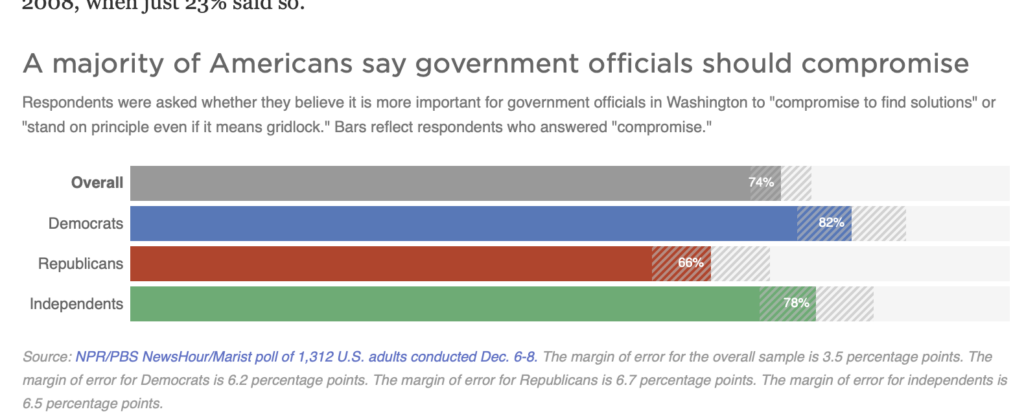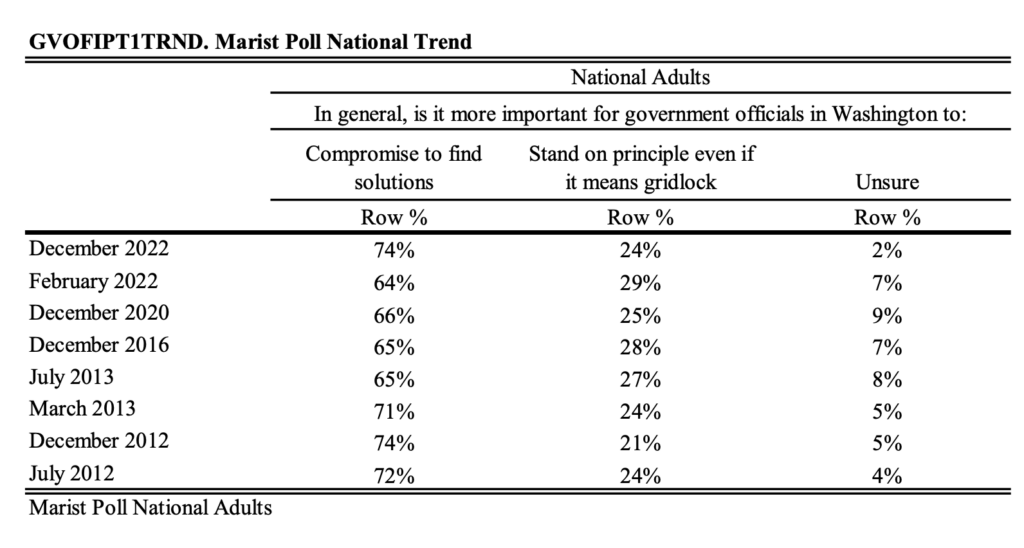Americans Want Compromise
Some numbers from an NPR/PBS Marist poll.

The following from NPR caught my ear this morning: Poll: Americans want compromise, but have no confidence Congress will work together.

This is hardly shocking, as compromise is usually considered to be a good thing. The real question is: compromise over what? And, more importantly, to what degree does the respondent think that “compromise” means my side moves more or the other side does?
This represents an increase in the general desire to compromise over recent years, although not surprisingly the over position over time is a significant pro-compromise super-majority of varying levels:

As a general proposition, I do think that people are interested in, and willing to, compromise, especially in the aggregate. However, our system does not reward compromise. A simple example of this fact is this: if I am a member of Congress who compromises with the other side, I may well face an angry subset of voters in the primary who didn’t want me to compromise, even if the majority of voters in my district would have preferred that that was exactly what I should have done.
Re-election requires re-nomination. Re-nomination requires appeasing the angry anti-compromise minority, rather than pleasing the generally pro-compromise majority.
It also doesn’t help that at the end of the day my choices are belonging to Group A or Group B, which are pitted against one another in a death struggle over control. This is a structural condition that disincentives compromise.
The entire poll is here.






The one big problem is the Inigo Montoya Principle: You keep using that word. I don’t think it means what you think it means*.
And the Big Unspoken Assumption: all sides have similar purposes.
Most often they don’t. that is, it’s not as though both Democrats and Republiqans want to tackle the big climate issues and differ on the means. Rather one party does, and the other is opposed. Compromise is eminently possible on the former, and rather impossible on the latter.
*Not Steven in particular, but many of the people answering the poll question. Many, if not most, kind of think of compromise as “You give me all I want, and in return I’m willing to forego something small and insignificant that is perhaps 0.5% of what you want.”
“Compromise over what” is in fact the important question, leading to “What are the issues which divide us?”
The divisive issues are not things like economic policy, tax policy, numbers based issues which lend themselves to haggling and negotiation.
The single biggest issue driving our politics is the status of our fellow citizens.
E.g., are LGBTQ people fully equal and deserving of dignity, or misguided perverts?
Who controls a woman’s reproductive choices?
This is a binary, not a continuum. There is no compromise available.
This. This is a better-constructed question than the last poll you brought to our attention. But I don’t think it’s useful in terms of telling us anything concrete because it’s asking about an abstract and highly subjective topic.
It would be much more useful if it presented an example of what might be considered a compromise position on one or more key issues to help inform the response. Or to @Chip Daniels: ‘s point, asking questions about specific areas where they would like to see “compromise” take place.
That was fun. If I forget to fill in name and email the system used to chide me to do so. Now apparently it disappears the comment I spent at least two minutes of hard work on. But back to the comment:
It used to was Ds wanted to increase defense spending by 3% and Rs by 10, so we’d compromise on 9. Now:
Ds want women to decide when to have kids and GOPs want to force them.
Ds think the government should pay it’s bills and GOPs are willing to blowup the world’s financial system.
Ds think elections should select office holders and GOPs think GOP state legislatures should.
Ds want to deal with AGW and GOPs are determined not to.
Ds think LGBTQ people should be able to live their lives and GOPs think they should be persecuted.
Ds think guns are dangerous to have around in large quantities and GOPs think gun ownership is a sacrament.
And so on.
What’s the appropriate point of compromise between sensible and cray cray?
No they (we) don’t. If we reallly did want compromise we wouldn’t have the political environment we have today. We wouldn’t have experienced a Trump presidency and all that that bequeathed us.
As others have said, it’s all in the details. If you ask people the general question re: compromise they will tell a pollster, ‘yes’ partly because it sounds so … reasonable, so thoughtful, so not-part-of-the-problem. I’d love to see the polling breakout tabulations on individual ‘issues’, like abortion, gun regulation, privatization of social security and medicare, drag queen library readings, etc.
@al Ameda:
I partially agree, but I will still underscore: our system does not promote politics that would be conducive to compromise, but instead the opposite.
Where in our system are politicians rewarded for compromising?
On the other hand, when I did the same thing yesterday, I got the edit opportunity that I’d been refused minutes before and had opened a new comment to make.
(Did that make sense? I’m not sure how to say it better. 🙁 )
The largest approval in current nationwide single-issue polling is agreement on the need for single-payer healthcare in the US. D’s support this and R’s do not, and both parties currently compromise by implementing the Republican position of doing nothing to meet what citizens overwhelmingly support.
I would like the Republicans to compromise more — to pursue what is good for the country rather than what is good for their base.
Democrats worked to push relief to Americans during the worst part of the Covid pandemic, despite Trump being president and likely to be the political beneficiary of less personal economic devastation.
And now Republicans are talking about blowing up the economy with debt ceiling games.
Unfortunately, if I were included in that poll, my views would be lumped in under vague “compromise” so people like Manchin would justify giving up on Democratic policy goals in the name of compromise.
Actually, saying that compromise is a good thing marks one as a flaming liberal, these days. Compromise is only possibly laudable for consequentialists, who are trying to balance good vs. bad outcomes. For deontologists (like most current US conservatives) “compromise” is a synonym for abdication of values. When certain choices are morally right and others are morally wrong, there isn’t any countervailing benefit that can compensate for condoning the wrong.
A good deontologist would rather see everyone living in righteous misery than sinful happiness. How could compromise with such a person be possible? The consequentialist has nothing to trade that would be valued.